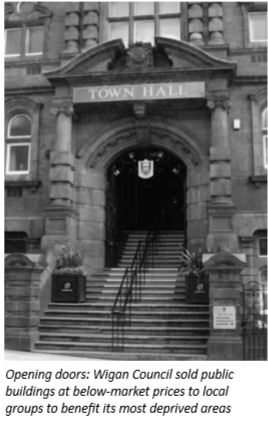 Transferring public property to the community and frustrations around the Autism Strategy were big topics at the social care and health commissioners’ conference. Jo Adshead reports
Transferring public property to the community and frustrations around the Autism Strategy were big topics at the social care and health commissioners’ conference. Jo Adshead reports
Against the backdrop of a pending general election, the most uncertain of Brexits and biblical
flooding in the Midlands, commissioners who may have felt they had seen it all were not deterred. Around 230 delegates at the National Commissioning and Contracting Training Conference in Alfreton in Derbyshire discussed how they had sought ever more creative solutions to providing for the most vulnerable in our communities. At the annual event, held over two days in November, they could share, network and showcase their knowledge and innovation.
Community ownership
Keith Cunliffe, cabinet member for adult social care at Wigan Council in Lancashire, had the audiences captivated in both a panel presentation and a workshop. As a local politician, it was his first time at the conference but he wasted no time in airing his view that, in the toughest of times, the need to save money had brought an opportunity for innovation and the direct consequence of being given flexibility, freedom and the opportunity to innovate had mobilised the community. Wigan, Cunliffe states, was the third worst-hit local authority by austerity. Community asset transfers – where ownership of public land and buildings from public bodies is passed to community organisations for less than market value to achieve a social benefit – took place in the most deprived of areas where people were most socially isolated. Sunshine House Community Centre in Scholes was adapted to enable a man with a physical disability to run a floristry course and coffee mornings, thereby managing his isolation by enabling himto share his strengths with others. Allotment projects were transformed into dementia day care and provided meaningful occupation for learning disabled adults, with only £25,000 of funding to build a cabin. Wigan’s next challenge was to scale up the operation to cover the whole of the borough. Cunliffe, whose background is in mental health, described the major process of assets-based transformation, the assets being those of the people within the community. He persuaded those in power to embrace widespread cultural change and abandon ingrained ways of working. Key to this was building a new relationship with the public and working more closely with the NHS and the voluntary sector. It was evident that substantial savings and improvements had been made while involving patients, service users and communities as active partners rather than passive recipients of services.
Autism strategy: progress and priorities Trevor Wright was asked to take over as the statutory Autism Act lead for his local authority in 2013 and, as a result, discovered that he himself was on the autistic spectrum.
“The record on progress in improving autism services was ‘pretty damning’”
He is now the co-chair of the Department of Health and Social Care autism executive board and headed a Friday afternoon workshop to explore the progress made over the 10 years since the Autism Act came into force. He is well placed, with his own diagnosis in his late 50s explaining his lifelong feelings of difference and the experience of his daughter’s autism, to understand the effectiveness of the act. Since the act came in, the executive board has gone through six ministers and the autism self-assessment framework has been the only mechanism for checking if the act has been effective. More positively, Wright reported, autism is the only life-long condition with a statutory strategy. Frustratingly, the December general election delayed the publication of the revised strategy. Purdah aside, he was able to share some elements of the 2019 review. This is set to include children, develop clinical guidance for diagnostic services and improve the transition from children’s to adult services. The overall aim is to improve the understanding of autism and all its profiles. Access to justice and mental health care are also priorities. A shocking 75% of autistic adults have reached out for mental health services, which are severely lacking. Wright described the record on progress in improving autism services in the past 10 years as “pretty damning”. Although he acknowledged there were pockets of good practice, difficulties remained regarding the diagnosis of older people, black and minority ethnic groups, and women and girls. There are often no pre-diagnosis interventions and a lack of support for people who have other conditions too, such as obsessive compulsive disorder and attention deficit hyperactivity disorder. He called for the creation of an autism inclusive society. He said positive behaviour management needed to be understood from the perspective of the individual understanding their own behaviours and triggers, not focusing on restraint. More support for highfunctioning people and for parents and siblings was needed, he added, as well as a workforce with the required level of knowledge and skills. Other presentations from the day can be found at: www.ncctc.co.uk/presentations/navigate/567/412
Jo Adshead is the chief executive of Linkability: www.linkability.org.uk
